Additional Opportunities
Airborne School
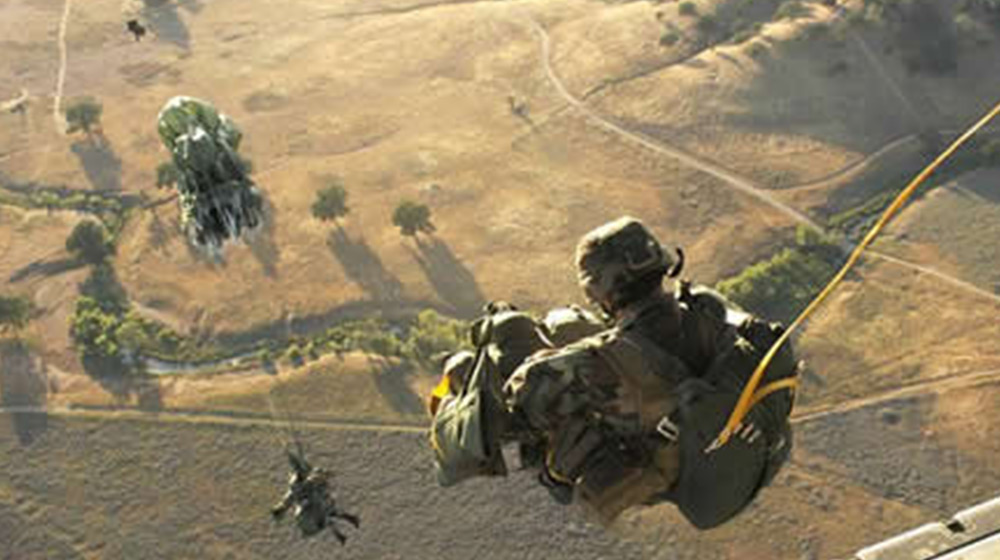
Airborne School is a three-week school conducted at Fort Benning, GA, and trains soldiers to conduct military parachute operations. Instruction is broken down into three one-week phases: Ground Week, Tower Week, and Jump Week, and encompasses all aspects of jumping. A cadet obtains a slot in Airborne School by virtue of his/her performance during the school year. During the final week of the course, cadets conduct five parachute jumps as a prerequisite to graduation. Cadets who graduate are awarded the Parachutist Badge.
Air Assault School
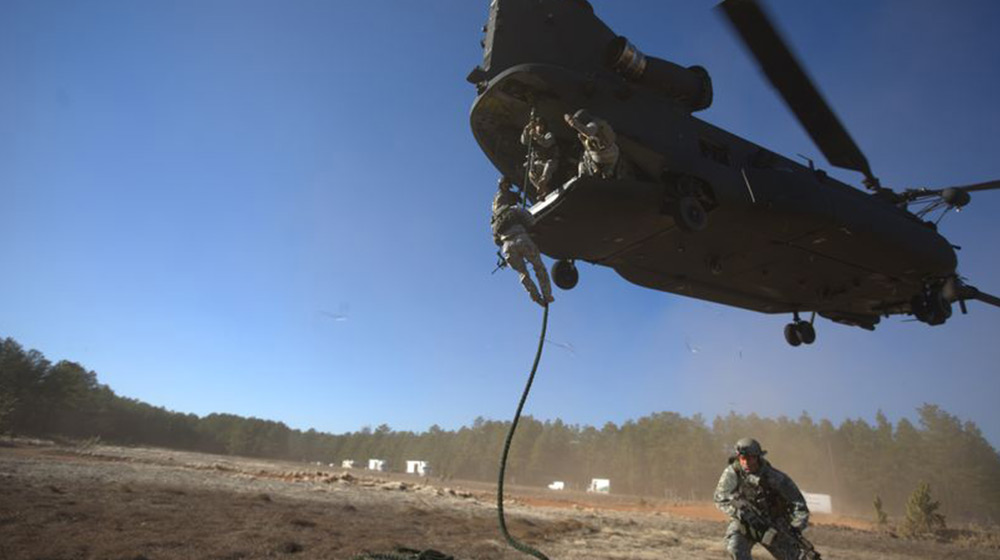
Air Assault School is conducted at various posts across the country. Instruction is centered around the combat assault from helicopters. The school is broken into three phases: The first covers conducting air assault operations; the second covers sling loading equipment to helicopters; and the third instructs the student on all aspects of rappelling from helicopters. Air Assault students are required to conduct two road marches within specified time blocks. Successful completion of this eleven day school qualifies the cadet to wear the Air Assault Badge.
Mountain Warfare School
Mountain Warfare School is a two-week course taught by the Vermont National Guard at Ethan Allen Firing Range in Jericho, Vermont. The training is designed to make you an expert in mountain operations. Mountain Warfare School is both physically and mentally demanding. The course covers rappelling, rock climbing, mountain survival, land navigation, first aid, and knots. Soldiers climb up and rappel down mountains, tie rope systems to make bridges, navigate the land by day and night, and learn how to care for and evacuate casualties. Training is non-stop, 15 hours per day, for 14 days.
Northern Warfare School
Northern Warfare School is a three week course designed to train soldiers on mobility operations in mountainous and artic terrain, glaciers, and inland waterways. Based out of Fort Greely, AK, students are taught basic mountain climbing techniques, ice climbing, and navigation. The mountain phase focuses on climbing, rappelling, and medical evacuation at altitude. The river phase covers boat operations, river charting, and route navigation. The glacier phase involves crevasse rescue, step cutting and anchors, belaying, and party climbing. The culmination of the course is a three day operation on Gulkana Glacier in Alaska.
Jungle Operations Training Course
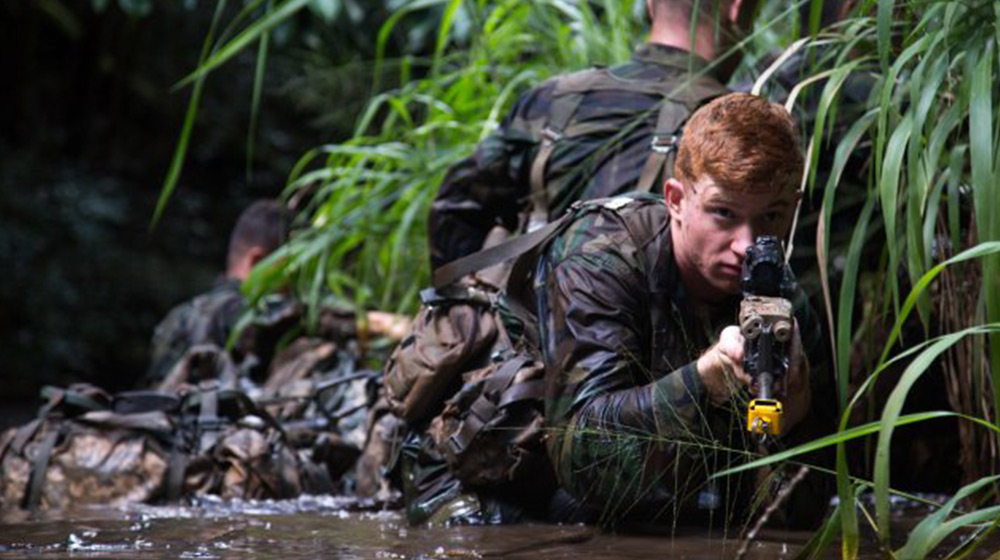
The Jungle Operations Training Course (JOTC) is an intense three-week course located on the East Range Training Center of Schofield Barracks, Oahu, Hawaii. Nestled between the Waianae mountain range to the west, and the Koolau mountain range in the east, the JOTC trains soldiers on small-unit tactics in jungle terrain, basic survival skills, and the challenges of operations in harsh environments. All of the training is hands-on, and soldiers in the JOTC spend 24 hours a day, seven days a week beneath the thick canopy of trees and among the dense undergrowth of the Hawaii jungle. Cadets who are interested in competing for a JOTC slot must demonstrate their top physical conditioning and mental stamina, as both will be needed to complete this grueling course where 30 to 40 percent of students do not finish. Graduates of the Jungle Operations Training Course are awarded the Jungle Expert Tab.
Combat Diver Qualification Course
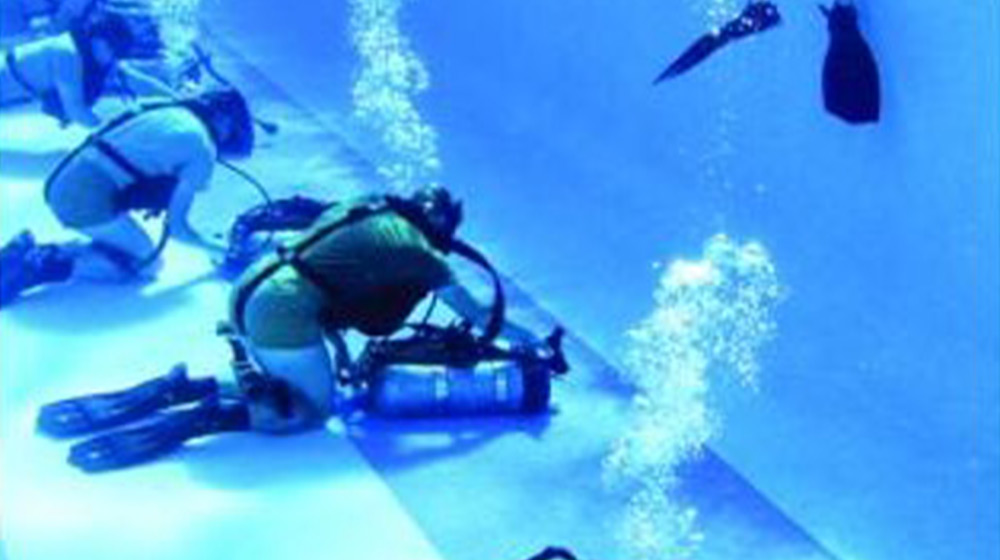
The Combat Diver Qualification Course (CDQC) is an extremely challenging opportunity for only the most qualified and motivated cadets. This seven-week course is taught at the Special Forces Underwater Operations School in Key West, Florida, and is a mentally and physically intense and challenging program. Regarded by many as one of the toughest schools in the military, students at the CDQC learn surface and sub-surface waterborne infiltration methods, deep diving, and diving physics/injuries. The CDQC is an elite course that is usually reserved for soldiers in Special Forces, but slots for ROTC cadets open up on rare occasions. Graduates of this course are awarded the Special Operations Diver Badge.
Cadet Professional Development Training
CTLT
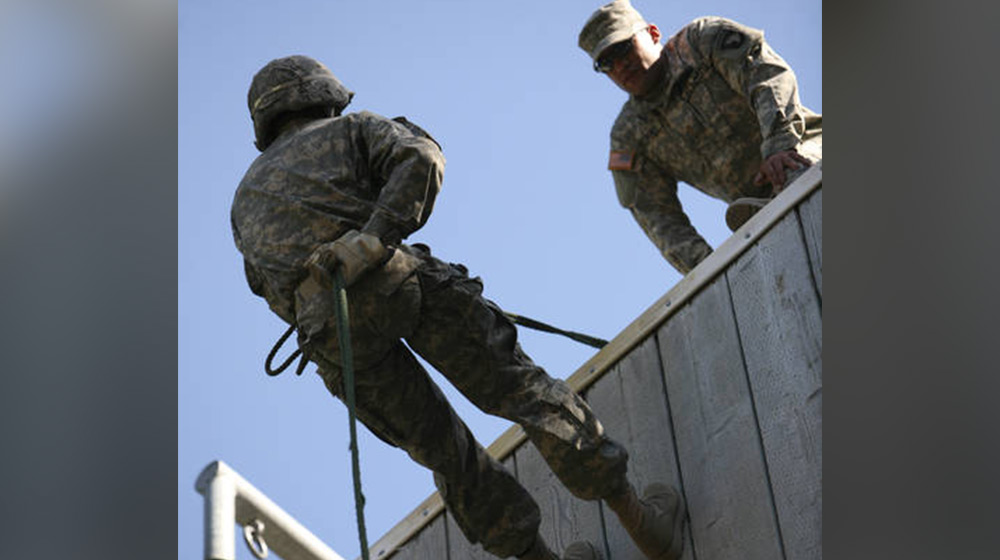
Cadet Troop Leader Training (CTLT) provides cadets an opportunity to experience leadership in an Army unit over a three to four week period during the summer, in between academic terms. Cadets are assigned to Second Lieutenant positions in the active Army, to units in the United States or across the world, and are expected to lead soldiers in the accomplishment of unit missions. This on-the-job experience is potentially the most relevant and rewarding leadership training available to cadets in their preparation for commissioning as Second Lieutenants. CTLT cadets interact with unit commanders, junior officers, non-commissioned officers, and junior enlisted soldiers in the "real life" environment of a United States Army unit. Assignment to particular units or locations is based on allocations. In addition to room and board and reimbursement for travel expenses, cadets also receive pay while participating in CTLT.
Airborne School

Airborne School is a three-week school conducted at Fort Benning, GA, and trains soldiers to conduct military parachute operations. Instruction is broken down into three one-week phases: Ground Week, Tower Week, and Jump Week, and encompasses all aspects of jumping. A cadet obtains a slot in Airborne School by virtue of his/her performance during the school year. During the final week of the course, cadets conduct five parachute jumps as a prerequisite to graduation. Cadets who graduate are awarded the Parachutist Badge.
Air Assault School

Air Assault School is conducted at various posts across the country. Instruction is centered around the combat assault from helicopters. The school is broken into three phases: The first covers conducting air assault operations; the second covers sling loading equipment to helicopters; and the third instructs the student on all aspects of rappelling from helicopters. Air Assault students are required to conduct two road marches within specified time blocks. Successful completion of this eleven day school qualifies the cadet to wear the Air Assault Badge.
Mountain Warfare School
Mountain Warfare School is a two-week course taught by the Vermont National Guard at Ethan Allen Firing Range in Jericho, Vermont. The training is designed to make you an expert in mountain operations. Mountain Warfare School is both physically and mentally demanding. The course covers rappelling, rock climbing, mountain survival, land navigation, first aid, and knots. Soldiers climb up and rappel down mountains, tie rope systems to make bridges, navigate the land by day and night, and learn how to care for and evacuate casualties. Training is non-stop, 15 hours per day, for 14 days.
Northern Warfare School
Northern Warfare School is a three week course designed to train soldiers on mobility operations in mountainous and artic terrain, glaciers, and inland waterways. Based out of Fort Greely, AK, students are taught basic mountain climbing techniques, ice climbing, and navigation. The mountain phase focuses on climbing, rappelling, and medical evacuation at altitude. The river phase covers boat operations, river charting, and route navigation. The glacier phase involves crevasse rescue, step cutting and anchors, belaying, and party climbing. The culmination of the course is a three day operation on Gulkana Glacier in Alaska.
Jungle Operations Training Course

The Jungle Operations Training Course (JOTC) is an intense three-week course located on the East Range Training Center of Schofield Barracks, Oahu, Hawaii. Nestled between the Waianae mountain range to the west, and the Koolau mountain range in the east, the JOTC trains soldiers on small-unit tactics in jungle terrain, basic survival skills, and the challenges of operations in harsh environments. All of the training is hands-on, and soldiers in the JOTC spend 24 hours a day, seven days a week beneath the thick canopy of trees and among the dense undergrowth of the Hawaii jungle. Cadets who are interested in competing for a JOTC slot must demonstrate their top physical conditioning and mental stamina, as both will be needed to complete this grueling course where 30 to 40 percent of students do not finish. Graduates of the Jungle Operations Training Course are awarded the Jungle Expert Tab.
Combat Diver Qualification Course

The Combat Diver Qualification Course (CDQC) is an extremely challenging opportunity for only the most qualified and motivated cadets. This seven-week course is taught at the Special Forces Underwater Operations School in Key West, Florida, and is a mentally and physically intense and challenging program. Regarded by many as one of the toughest schools in the military, students at the CDQC learn surface and sub-surface waterborne infiltration methods, deep diving, and diving physics/injuries. The CDQC is an elite course that is usually reserved for soldiers in Special Forces, but slots for ROTC cadets open up on rare occasions. Graduates of this course are awarded the Special Operations Diver Badge.
Cadet Professional Development Training
CTLT

Cadet Troop Leader Training (CTLT) provides cadets an opportunity to experience leadership in an Army unit over a three to four week period during the summer, in between academic terms. Cadets are assigned to Second Lieutenant positions in the active Army, to units in the United States or across the world, and are expected to lead soldiers in the accomplishment of unit missions. This on-the-job experience is potentially the most relevant and rewarding leadership training available to cadets in their preparation for commissioning as Second Lieutenants. CTLT cadets interact with unit commanders, junior officers, non-commissioned officers, and junior enlisted soldiers in the "real life" environment of a United States Army unit. Assignment to particular units or locations is based on allocations. In addition to room and board and reimbursement for travel expenses, cadets also receive pay while participating in CTLT.
